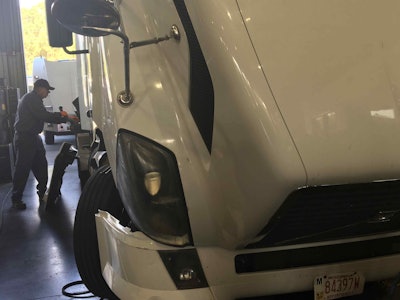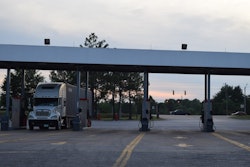 A nationwide network of 24-hour emergency service vendors dot the highway.
A nationwide network of 24-hour emergency service vendors dot the highway.Breakdowns rarely come at a convenient time but when they happen roadside – leaving driver, truck and cargo stranded on the highway hundreds or thousands of miles from the main office – it only adds insult to injury.
A nationwide network of 24-hour emergency service vendors dot the map, standing at the ready for everything from mechanical failures, to tires and towing as well as equipment relocation, driveway services and preventive maintenance issues that need handled over the road.
“We handle each event per our customers’ specialized instructions,” says Heather Dean, director of marketing and sales operations for FleetNet.
Among the benefits of using a breakdown service vendor – aside from not being stranded roadside – is they act like somewhat of an Angie’s List for truckers, allowing the service experience of previous customers to dictate who gets called for the next.
Dean says FleetNet ranks the service, quality and pricing of each of its vendors after each event, which she says gives the company insight into which vendors to use and which vendors to avoid.
“If a vendor performs poorly, they are ranked low in our system and therefore, not used again,” she says. “Because FleetNet manages over 450,000 events annually, customers enjoy our priority service due to repeat business with vendors.”
Emergency networks also benefit from their ability to buy services on scale. For example, Dean FleetNet negotiates rates with towing vendors she says saves customers more than 30 percent.
In almost all cases, emergency breakdown services can arrange warranty repairs and savings aside, having available a reliable network of emergency service acts as a security blanket for time sensitive deliveries.
“If you’ve got a load of ice cream that you’re carrying across the country, you can’t afford to not have some sort of emergency contingency,” says Jane Clark, NationaLease vice president of member services. “If you can wait a couple days, maybe you don’t need something like this but if you’ve got deadlines or perishable loads, you can’t afford to not have some kind of backup plan.”
Fleets that turn to emergency services as a final option usually argue the expense isn’t worth time saved, but Deans says if properly planned and executed an emergency service call can be your best option in many cases.
“Contacting a vendor without having [an] insurance certificate on file or not knowing their history with service calls can cost customers much more than the service fee if things don’t go smoothly,” she says.
Clark and Dean say both their companies begin contacting the most qualified service vendor as quickly as the call for help is placed and their respective average downtime can be measured in minutes versus days in many cases.
“The average downtime for non-major events is just over two hours from the time we receive the call until the unit is rolling again,” Dean adds.
Speed of repair can be critical, Clark says, even if you’re not hauling time sensitive loads. She says it’s also worth considering the time of day you do most of your driving, which could limit your options when the need arises.
“In the middle of the night, you’ve got to have something,” she says. “I just don’t think you can not have some kind of plan.”
NationalLease service is only available to network members.
FleetNet is an open network and offers contract rates. The company bills direct for contract customers.
“Contract customers with established credit are billed, where customers without a contract must pay at time of service,” Dean says. “Being able to bill a customer is more convenient for their drivers [and] dispatchers as they do not need to worry about a form of payment.”
For fleets willing to roll the dice on not needing a volume of roadside service annually, FleetNet also handles one-off calls for customers not under contract but finding themselves in a bind. However, the service fee for non-contract customers, Dean says, is a little higher than contract customers and those customers must pay the vendor at the time of service.











